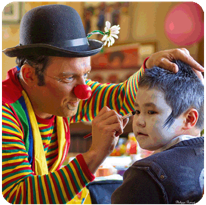 In the Internet age, people don’t need to leave their homes in order to access near limitless choices of entertainment. Although convenient for consumers, this cultural shift has sent attendance at many theaters and symphonies across the country on a downward spiral. But it’s not just highbrow pursuits that have seen a drop in public interest. In fact, circuses are in such a dire state that industry insiders fear their decline will lead to a nationwide decline in the number of professional clowns.
In the Internet age, people don’t need to leave their homes in order to access near limitless choices of entertainment. Although convenient for consumers, this cultural shift has sent attendance at many theaters and symphonies across the country on a downward spiral. But it’s not just highbrow pursuits that have seen a drop in public interest. In fact, circuses are in such a dire state that industry insiders fear their decline will lead to a nationwide decline in the number of professional clowns.
Membership in the World Clown Association has dropped from about 3,500 individuals in 2004 to 2,500 today. According to leaders at the trade group, the decline in circus attendance, a fading interest in the art of clowning, and an aging workforce have taken their toll over the years. Most of the association’s members are over 40, and efforts to recruit younger clowns have yielded little reward. According to Glen Kohlberger, president of Clowns of America International, many people who take up clowning don’t start early enough to pursue the craft as a professional career. “What happens is they go on to high school and college and clowning isn’t cool anymore,” Kohlberger said. “Clowning is then put on the back burner until their late 40s and early 50s.”
Compared to other entertainers, clowns can earn a reasonable and consistent living. With fewer clowns competing for gigs, a clown working around New York City can bring in $300 from a child’s birthday party. Touring gigs with big tops like Ringling Bros. and Barnum & Bailey Circus can provide lifelong employment. However, securing a position at one of the major touring companies isn’t as easy as booking birthday parties. With so few circuses operating today, Ringling Bros. and other outfits can afford to be picky. For instance, Ringling only accepted 11 people into its prestigious clown college out of 531 applicants. All told, the circus keeps a roster of just 26 clowns for its three touring productions. The next generation of Bozos will certainly need more opportunities than that if clowning is ever going to attract more interest.
Questions:
- Why have younger Americans failed to embrace the “art of clowning?”
- Can we expect live entertainment such as circuses to decline in the future?
Source: Natalie Musumeci, “National Clown Shortage May Be Approaching, Trade Organizations Fear,” New York Daily News, February 17, 2014. Photo by Philippe Rouzet.
